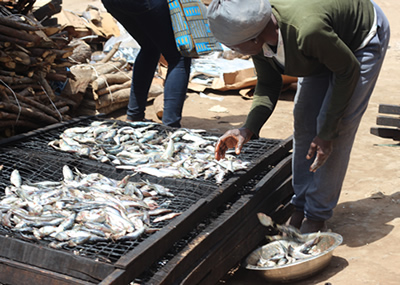USAID supports Ghana’s dwindling fisheries resources
 The United State Agency for International Development (USAID) has partnered some local Non-Governmental Organisations to empower local fishing communities on the proper management of fisheries resources as part of a co-management scheme being considered in Ghana.
The United State Agency for International Development (USAID) has partnered some local Non-Governmental Organisations to empower local fishing communities on the proper management of fisheries resources as part of a co-management scheme being considered in Ghana.
The co-management scheme has been recognised as a global best practice to sustain fisheries resources to ensure food security.
The USAID is implementing the programme through its Sustainable Fisheries Management Programmes (SFMP), with partners including Hen Mpoano, Friends of the Nation (FoN), the Central and Western Fishmongers Improvement Association and the Village Savings and Loans Association.
The USAID and its partners have developed draft local management plans together with communities in the Densu, Pra and Ankobra estuaries, which include community-led written plans aligned with the draft national co-management policy and further development of the national co-management framework.
Sustaining fisheries resources is particularly important for the most vulnerable population, as the fisheries sector is estimated to contribute over 60 per cent to total protein uptake nationally.
Through the partnerships, USAID-SFMP is working with the NGOs to operate within the Densu, Pra and Ankobra estuaries, to restore the mangroves and fisheries resources.
Mangroves are best known places where most fishes lay and hatch their fingerlings, which later swim back to the rivers and mature.
During a recent media outreach, organised by the USAID-SFMP, to fishing communities in the Western and Central Regions, it was revealed that most of the fishmongers depended on the mangroves as firewood fuel to smoke their fishes, leading to the depletion of the mangroves.
Therefore, at the Pra Estuary, FoN was being supported under the SFMP to catalyse an active community conservation effort that included restoration of both mangroves and fisheries resources, through replanting of depleted mangroves.
The Community members have also been empowered to institute their own closed season and fisheries and mangrove resources protected area along the estuary and on parts of the Pra River to promote fish conservation.
On the Ankobra Estuary, the Community had been assisted by Hen Mpoano to identify and preserve key mangrove areas that provided important breeding areas for some species and supported to replant the degraded mangroves.
Hen Mpoano also provided technical support to map the degraded mangrove sites and provided logistics to set up and maintain a mangrove nursery in Ankobra.
The Central and Western Fishmongers Improvement Association and SFMP are assisting the fishmongers to adopt best practices towards reducing post-harvest losses and ensuring improvement in the value chain.
The women at Elmina and Anlo Beach were also being empowered to adopt hygienic fish handling practices through the use of Ahotor Oven, an improved fish smoking technology developed by the Fisheries Commission and SFMP, thereby reducing the high polycyclic aromatic hydrocarbons (PAH) levels in the smoked fish that, hitherto, made it to be rejected on the EU markets.
Mr Maurice Knight, the Chief of Party of USAID-SFMP, told the Ghana News Agency that the media event was to highlight the work of the USAID’s partnership, being rolled out in collaboration with the Ministry of Fisheries and Aquaculture Development and the Fisheries Commission.
It was also to increase collaboration with the media in addressing the challenges facing the sector.
He said through the five-year partnerships much had been achieved in sustaining and restoring the sector through the adoption of best practices.
Mr Knight said the SFMP, in its three and a half-year journey, had been able to design an anti-child labour and trafficking strategy for the fisheries sector.
He mentioned the national co-management policy drafted for MoFAD, supporting the revision of the National Fisheries Act, considering additional weekly non-fishing holiday in collaboration with the Ghana Canoe Council, and working on closed season during a fishing reproductive period for August, every year, as some of the strategies.
Meanwhile, Mr Philip Prah, an officer of the Friends of the Nation, said their work with community members within the Pra area including Anlo Beach and Shama Apo in the Western Region had revealed the readiness of the fisher folk to support efforts at sustaining the sector.
Both the fishermen and fishmongers expressed happiness about the SFMP intervention and indicated their readiness to support efforts at sustaining the fisheries activities in the country.
Source: GNA
